- Home
- Nick Hornby
An Education
An Education Read online
Table of Contents
Title Page
Copyright Page
Introduction
SUNDANCE DIARY
CAST AND CREW
AN EDUCATION: - The Screenplay
APPENDIX: ALTERNATIVE ENDING
Nick Hornby is the author of the bestselling novels Juliet, Naked, Slam, A Long Way Down, How to Be Good,
High Fidelity, and About a Boy, and the memoir Fever Pitch. He is also the author of Songbook, a finalist for a National Book Critics Circle Award, Shakespeare Wrote for Money, Housekeeping vs. the Dirt, and The Polysyllabic Spree, and editor of the short story collection Speaking with the Angel. A recipient of the American Academy of Arts and Letters’ E. M. Forster Award, and the Orange Word International Writers’ London Award, 2003, Hornby lives in North London.
Also by Nick Hornby
FICTION
HIGH FIDELITY ABOUT A BOY HOW TO BE GOOD
A LONG WAY DOWN SLAM
JULIET, NAKED
NONFICTION
FEVER PITCH
SONGBOOK
THE POLYSYLLABIC SPREE HOUSEKEEPING VS. THE DIRT SHAKESPEARE WROTE FOR MONEY
ANTHOLOGY
SPEAKING WITH THE ANGEL
RIVERHEAD BOOKS
Published by the Penguin Group
Penguin Group (USA) Inc. 375 Hudson Street, New York, New York 10014, USA
Penguin Group (Canada), 90 Eglinton Avenue East, Suite 700,Toronto, Ontario M4P 2Y3, Canada (a division of Pearson Penguin Canada Inc.)
Penguin Books Ltd., 80 Strand, London WC2R 0RL, England
Penguin Group Ireland, 25 St. Stephen’s Green, Dublin 2, Ireland (a division of Penguin Books Ltd.)
Penguin Group (Australia), 250 Camberwell Road, Camberwell, Victoria 3124, Australia (a division of Pearson Australia Group Pty. Ltd.)
Penguin Books India Pvt. Ltd., 11 Community Centre, Panchsheel Park,
New Delhi—110 017, India
Penguin Group (NZ), 67 Apollo Drive, Rosedale, North Shore 0632, New Zealand (a division of Pearson New Zealand Ltd.)
Penguin Books (South Africa) (Pty.) Ltd., 24 Sturdee Avenue, Rosebank, Johannesburg 2196, South Africa
Penguin Books Ltd., Registered Offices: 80 Strand, London WC2R 0RL, England
The publisher does not have any control over and does not assume any responsibility for author or third-party websites or their content.
AN EDUCATION: THE SCREENPLAY
Copyright © 2009 Nick Hornby
All rights reserved.
No part of this book may be reproduced, scanned, or distributed in any printed or electronic form without permission. Please do not participate in or encourage piracy of copyrighted materials in violation of the author’s rights. Purchase only authorized editions.
RIVERHEAD is a registered trademark of Penguin Group (USA) Inc.
The RIVERHEAD logo is a trademark of Penguin Group (USA) Inc.
First Riverhead trade paperback edition: October 2009
eISBN : 978-1-101-14868-6
http://us.penguingroup.com
INTRODUCTION
The First Draft
I knew the moment I’d finished Lynn Barber’s wonderful autobiographical essay in Granta, about her affair with a shady older man at the beginning of the 1960s, that it had all the ingredients for a film. There were memorable characters, a vivid sense of time and place - an England right on the cusp of profound change - an unusual mix of high comedy and deep sadness, and interesting, fresh things to say about class, ambition and the relationship between children and parents. My wife, Amanda, is an independent film producer, so I made her read it, too, and she and her colleague Finola Dwyer went off to option it. It was only when they began to talk about possible writers for the project that I began to want to do it myself - a desire which took me by surprise, and which wasn’t entirely welcome. Like just about every novelist I know, I have a complicated, usually unsatisfactory relationship with film writing: ever since my first book, Fever Pitch, was published, I have had some kind of script on the go. I adapted Fever Pitch for the screen myself, and the film was eventually made. But since then there have been at least three other projects - a couple of originals, and an adaptation of somebody else’s work - which ended in failure, or at least in no end product, which is the same thing.
The chief problem with scriptwriting is that, most of the time, it seems utterly pointless, especially when compared with the relatively straightforward business of book publishing: the odds against a film, any film, ever being made are simply too great. Once you have established yourself as a novelist, then people seem quite amenable to the idea of publishing your books: your editor will make suggestions as to how they can be improved, of course, but the general idea is that, sooner or later, they will be in a bookshop, available for purchase. Film, however, doesn’t work that way, not least because even the lower-budget films often cost millions of pounds to make, and as a consequence there is no screenwriter alive, however established in the profession, who writes in the secure knowledge that his work will be filmed. Plenty of people make a decent living from writing screenplays, but that’s not quite the same thing: as a rule of thumb, I’d estimate that there is a 10 per cent chance of any movie actually being put into production, especially if one is working outside the studio system, as every writer in Britain does and must. I know, through my relationship with Amanda and Finola and other friends who work in the business, that London is awash with optioned books, unmade scripts, treatments awaiting development money that will never arrive.
So why bother? Why spend three, four, five years rewriting and rewriting a script that is unlikely ever to become a film? For me, the first reason to walk back into this world of pain, rejection and disappointment was the desire to collaborate: I spend much of my working day on my own, and I’m not naturally unsociable. Signing up for An Education initially gave me the chance to sit in a room with Amanda and Finola and Lynn and talk about the project as if it might actually happen one day, and later on I had similar conversations with directors and actors and the people from BBC Films. A novelist’s life is devoid of meetings, and yet people with proper jobs get to go to them all the time. I suspect that part of the appeal of film for me is not only the opportunity for collaboration it provides, but the illusion it gives of real work, with colleagues and appointments and coffee cups with saucers and biscuits that I haven’t bought myself. And there’s one more big attraction: if it does come off, then it’s proper fun, lively and glamorous and exciting in a way that poor old books can never be, however hard they try. Even before this film’s release, we have taken it to the Sundance Festival in Utah, and Berlin. And I have befriended several of the cast, who, by definition, are better-looking than the rest of us . . . What has literature got, by comparison?
I wrote the first draft of An Education on spec, sometime in 2004, and while doing so, I began to see some of the problems that would have to be solved if the original essay were ever to make it to the screen. There were no problems with the essay itself, of course, which did everything a piece of memoir should do; but by its very nature, memoir presents a challenge, consisting as it does of an adult mustering all the wisdom he or she can manage to look back at an earlier time in life. Almost all of us become wiser as we get older, so we can see pattern and meaning in an episode of autobiography - pattern and meaning that we would not have been able to see at the time. Memoirists know it all, but the people they are writing about know next to nothing.
We become other things, too, as well as wise: more articulate, more cynical, less naïve, more or less forgiving, depending on how things have turned out for us. The Lynn Barber who wrote the memoir - a celebrated journalist, known for her perspicacious, funny, occasionally devastating profiles of celebrities - s
houldn’t be audible in the voice of the central character in our film, not least because, as Lynn says in her essay, it was the very experiences that she was describing that formed the woman we know. In other words, there was no ‘Lynn Barber’ until she had received the eponymous education. Oh, this sounds obvious to the point of banality: a sixteen-year-old girl should sound different from her sixty-year-old self. What is less obvious, perhaps, is the way the sixty-year-old self seeps into every brush-stroke of the self-portrait in a memoir. Sometimes even the dialogue that Lynn provided for her younger version - perfectly plausible on the page - sounded too hard-bitten, when I thought about a living, breathing young actress saying the words. I had been here before, in a way, with the adaptation of Fever Pitch. In a memoir, one tries to be as smart as one can about one’s younger self - that’s sort of what the genre is, and that’s what Lynn had done. In a screenplay, however, one has to deny the subject that insight, otherwise there’s no drama, just a character understanding herself and avoiding mistakes.
The other major problem was the ending. Lynn Barber nearly threw her life away, nearly missed out on the chance to go to university, nearly didn’t sit her exams. And though lots of movie endings derive their power from close shaves, they tend to be a little more enthralling: the bullet just misses the hero, the meteor just misses our planet. It was going to be hard to make people care about whether a young girl got a place at Oxford, no matter how clever she was. Lynn became Jenny after the first draft or two; there were practical reasons for the change, but it helped me to think about the character that I was in the process of creating, rather than the character who existed already, the person who had written the piece of memoir: I could attempt to raise the stakes for Jenny, whereas I would have felt more obliged to stick to the facts if she had remained Lynn.
Some stories mean something, some don’t. It was clear to me that this one did, but I wasn’t sure what, and the things it meant to me weren’t and couldn’t be the same as the things it meant to Lynn: she had found, in this chapter of her life, all sorts of interesting clues to her future, for example, but I couldn’t worry about my character’s future. I had to worry about her present, and how that present might feel compelling to an audience. It would take me several more drafts before I got even halfway there.
BBC Films
The first time I had a formal conversation with outsiders in the film industry about An Education, it didn’t go well. Somebody who was in a position to fund the film - because Amanda and Finola, as independent producers, do not and cannot do that - had expressed an interest, read my first draft, invited us in to a meeting. His colleague, however, clearly wasn’t convinced that there was any potential in the film at all, and that was that.This reflected a pattern repeated many times over the next few years: there was interest in the script, followed by doubts about whether any investment could ever be recouped. Sometimes it felt as though I was in the middle of writing a little literary novel, and going around town asking for a £4 million advance for it. Our belief in the project, our conviction that it could one day become a beautiful thing, was sweet, and the producers’ passion got us through a few doors, but it didn’t mean that we weren’t going to cost people money. Another problem with the film’s commercial appeal was beginning to become apparent, too: the lead actress would have to be an unknown - no part for Kate or Cate or Angelina here - and no conventional male lead would want to play the part of the predatory, amoral, possibly lonely David, the older man who seduces the young girl. (Peter Sarsgaard, who responded and committed to the script at an early stage, is a proper actor: he didn’t seem to worry much about whether his character would damage his chances of getting the lead in a romantic comedy.)
The good people at BBC Films, however, saw something in the script - either that, or the desperation in our eyes - and funded the development of An Education, which meant paying me to write another draft, and giving Amanda and Finola some seed money. The meeting we had with David Thompson and Tracey Scoffield went the way no conversations of this kind go, in my experience: as we talked, their professional scepticism was replaced by enthusiasm and understanding. This is supposed to be the point of meetings, from the supplicants’ point of view, anyway; but in my experience (and probably in yours, too, whatever your profession), nobody who was previously doubtful is ever really open to persuasion or suggestion. The fact that the thirty minutes or so spent talking to David and Tracey wasn’t a waste of time is more remarkable than it should be.
I didn’t need money to write another draft of the script, of course; I am well paid in my other profession, and there’s very little to be earned in British film, especially at this early stage. But money has a symbolic value, too. We all needed some indication that others in the industry felt as enthusiastic about An Education as we did, otherwise we could be pretty sure that any future energy poured into the project would run right through it and down the drain. BBC Films gave us a sense of purpose. They were not in a position to fund the film, but they could help us get the project into shape so that others might want to.
The Banana
In the original piece, and in the film itself, our herione’s seducer produces a banana on the night he wants to take her virginity, apparently because he thinks it will result in ease of access. It was a strange and revealing detail that I wanted to keep, because it indicated something of David’s gaucheness.
At a BBC script meeting, David Thompson, then head of BBC Films, started to muse aloud about this particular scene.
‘The banana,’ he said hesitantly. ‘Could it . . .Would it work?’
He directed the question at Amanda and Finola. They shifted uncomfortably in their seats. There was a silence.
Jamie Laurenson, one of the executive producers, cleared his throat.
‘I don’t think . . . I don’t think it would be a peeled banana,’ he said.
‘Ah!’ said David. ‘Unpeeled! I see.’
We moved on, gratefully.
Directors
It helps to attach a director to the project, too, for exactly the same reasons. Beeban Kidron read whatever was the most recent draft, liked it, met to talk about it, and then worked with me on the script for the best part of a year. (These years slip by, so it’s a relief to remember that other things were happening while An Education wasn’t being made. I wrote my young adult novel Slam, and my third son was born; Finola was off making the HBO drama Tsunami. We have something to show for that time.) I loved working with Beeban, who lives round the corner from my office and could therefore meet within five minutes of receiving an email, if she was around; it was through talking to her, thinking about what she needed from the script as a film-maker, that I made several important improvements to the script. Certainly Jenny’s complicity in many of David’s deceptions, her willingness to manipulate her parents, came out of my work with Beeban; we took as our cue Lynn Barber’s admission, in the original piece, that when she witnessed ‘David’ stealing the map, she didn’t do anything about it.The decision we made during that time made the script more morally complicated, and the film is the richer for it.
Beeban and I had a cloud hanging over us, however. She was attached to another movie which, like ours, had spent a long time in development. Eventually it became apparent that she couldn’t do both, that they were going to clash, and reluctantly (I think and hope) she decided to go with the project which had predated ours. We were back to square one.
We talked to several more directors after Beeban’s departure. Most wanted to develop the script further, which was fair enough; the trouble is that no two directors could agree on the route we should be taking. One young director even wondered whether the whole 1962 thing was a red herring - had we thought of setting it in the present day? No, we hadn’t. I was particularly keen to work with a woman director - yes, I had female producers to keep a watch on Jenny as she developed in the script, but the value of a woman director who could work with our young actress on set would, I felt, be incalcu
lable - and when Lone Scherfig, the Danish director of Italian for Beginners , expressed an interest in making the film, we all wanted to listen to what she had to say. Lone turned out to be smart about the script, endlessly enthusiastic, and with an outsider’s eye for detail; after she’d taken the job, she set about immersing herself in the look of 1962 England, its clothes and its cars and its cakes. We were lucky to find her.
The Cast
So then we were four: Amanda, Finola, Lone and I. And, for some time, we’d been talking to casting director Lucy Bevan. I’m quite often asked how much input I have in the various processes of film-making - ‘Do you have a say in the casting, for example?’ And though I’d like to claim credit for just about everything, the truth is that I simply don’t know enough about actors (or directors, or editors, or designers, or composers) to contribute to these decisions in any meaningful way. How many young actresses did I know capable of playing the part of Jenny, for example? None at all. What about male actors for the part of David? Well, there was Colin Firth, of course, who I knew from Fever Pitch. And John Cusack (High Fidelity), and Hugh Grant and Nicholas Hoult from About a Boy, and the guy with the haircut from No Country for Old Men; which I’d just seen, probably, right before I was asked for my opinion . . . OK, not one of these was right, but they were all I could think of. Lucy Bevan’s job is to read a script and come up with scores of imaginative suggestions for each part, and she’s brilliant at it. On the whole, it’s best that the casting director, rather than the writer, has a say in casting.

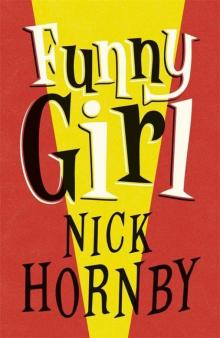 Funny Girl
Funny Girl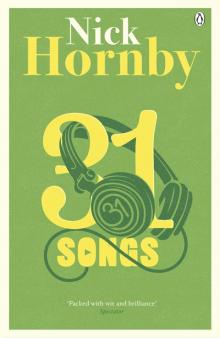 31 Songs
31 Songs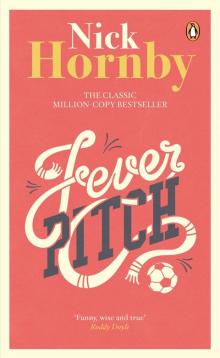 Fever Pitch
Fever Pitch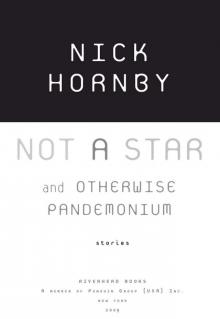 Not a Star and Otherwise Pandemonium
Not a Star and Otherwise Pandemonium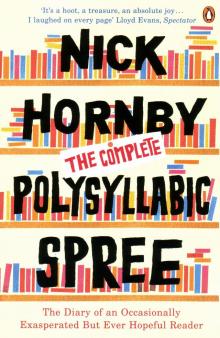 The Complete Polysyllabic Spree
The Complete Polysyllabic Spree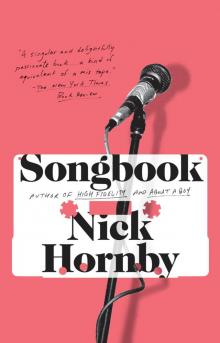 Songbook
Songbook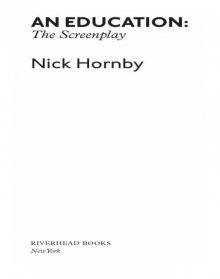 An Education
An Education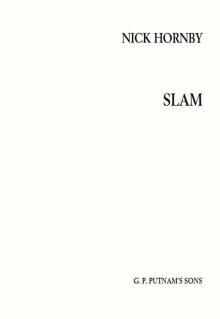 Slam
Slam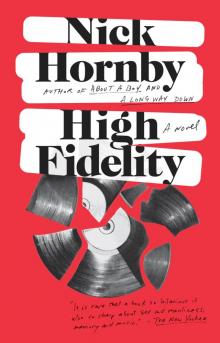 High Fidelity
High Fidelity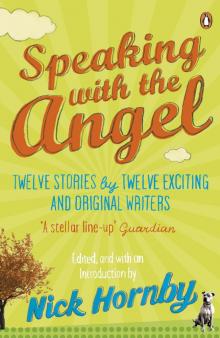 Speaking With the Angel
Speaking With the Angel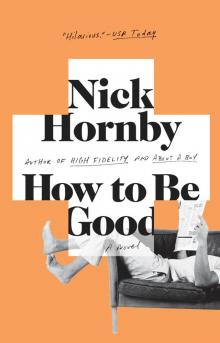 How to Be Good
How to Be Good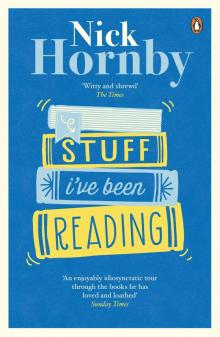 Stuff I've Been Reading
Stuff I've Been Reading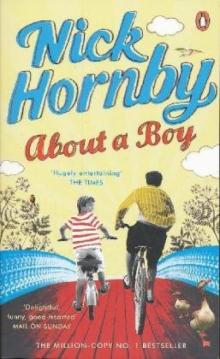 About a Boy
About a Boy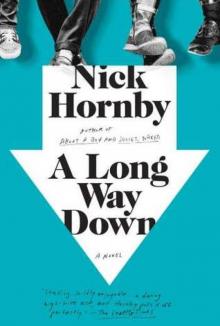 A Long Way Down
A Long Way Down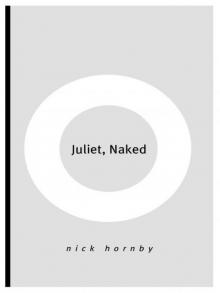 Juliet, Naked
Juliet, Naked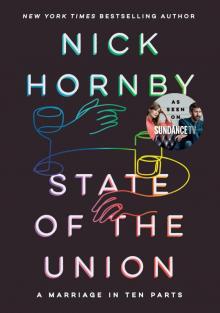 State of the Union
State of the Union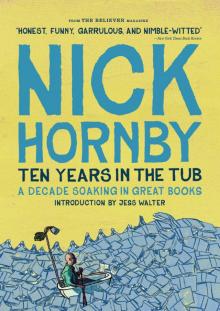 Ten Years in the Tub: A Decade Soaking in Great Books
Ten Years in the Tub: A Decade Soaking in Great Books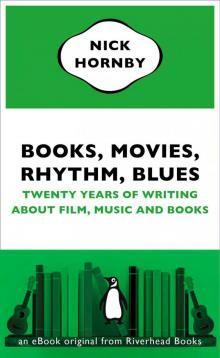 Books, Movies, Rhythm, Blues: Twenty Years of Writing About Film, Music and Books
Books, Movies, Rhythm, Blues: Twenty Years of Writing About Film, Music and Books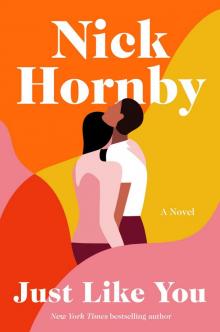 Just Like You
Just Like You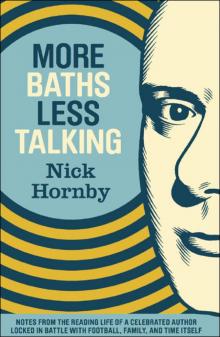 More Baths Less Talking
More Baths Less Talking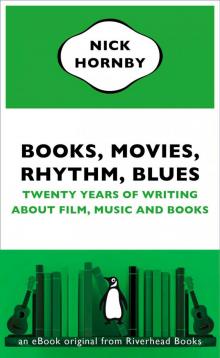 Books, Movies, Rhythm, Blues
Books, Movies, Rhythm, Blues